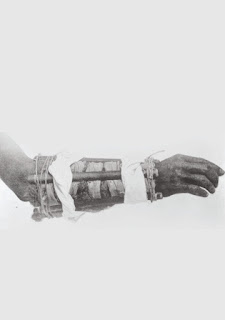الله يجبر كسرك

يقولون لمن مات له أحد (الله يجبر كسرك) و(الله يجبر الكسر)، من باب المواساة. و(جبر الضرر) هو إصلاح ما اعوج من المعاملات المالية لتلافي أو تخفيف ما قد يمنع قع من ضرر كبير غير متوقع على الآخرين. وحين يقولون لشيء (وقفت فوقه الجُبارة) يقصدون منعت الجُبارة فساده وهلاكه. و(فك الجُبارة) هو منع فساد الحظ والفشل. جبر المريض صلح حاله والرجل عاد اليه ما ذهب عنه. قال الشاعر الشعبي (جبارة الضعيف للقلبه خاف بشار) أي أن من يمدحه هو يجبر الضعيف ويؤمن الخائف. ونقول (الجبارة جاتك) لمن أتته الثروة (في خت الودع ). وجبر المريض أو الضعيف، هو أصلاح حالهما. قال الشاعر العربي الحطيئة: (هم لاحموني بعد فقر وفاقة كما لاحم العظم الكسير جبائره). والبصير هو الشخص الذي تحلى بعمق النظر والحكمة والخبرة ومهارة اليد والبصير أو جبار الكسور هو الشخص الذي يجبر الكسور ويصلحها، ويقومما التوى من المفاصل. والجبيرة عيدان وقماش تساعد في تماسك العضو واستقراره حتى يلتئم. عرف البصيربالخبرة أن كسور العظام البسيطة يمكن أن تلتئم إذا طببوها بأغصان الأشجار أو بأليافها، فجبروا كسور العظام الطويلة في الأيدي والأرجل بوضع ضمادات بسيط